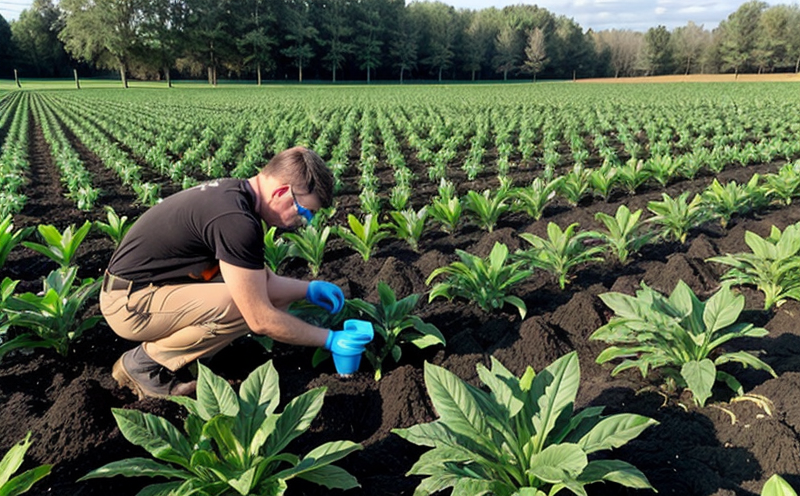Water-Soluble Potassium Testing in Fertilizers
Water-soluble potassium (K2O) testing is a critical procedure for ensuring the quality, efficacy, and compliance of fertilizers. In agriculture and forestry, potassium is one of the essential macronutrients that plants need to grow healthy leaves, roots, stems, and fruits. Potassium supports various physiological processes within plants such as photosynthesis, protein synthesis, carbohydrate formation, and water regulation.
Fertilizers are formulated with specific nutrient ratios based on soil analysis, crop requirements, and environmental conditions. Accurate determination of potassium content in fertilizers is essential for optimizing plant growth while minimizing the risk of over-fertilization or under-nutrition. This ensures sustainable agricultural practices that promote both economic efficiency and environmental protection.
Water-soluble potassium testing involves dissolving a known weight of fertilizer sample in distilled water, then measuring the concentration of K2O ions released into solution using either titrimetric or gravimetric methods. The resulting percentage represents the percentage by mass of available potassium in the fertilizer.
The importance of this test cannot be overstated, especially given increasing concerns over soil degradation and nutrient runoff into water bodies. By accurately measuring K2O content, laboratories can provide reliable data that helps farmers make informed decisions about their fertilization practices. This not only improves crop yields but also reduces the negative impact on local ecosystems.
In recent years, there have been significant advancements in analytical techniques for water-soluble potassium testing, including atomic absorption spectrophotometry (AAS), inductively coupled plasma optical emission spectroscopy (ICP-OES), and ion chromatography. These modern methods offer higher precision, reduced sample preparation times, and lower detection limits compared to traditional gravimetric approaches.
At our laboratory, we employ state-of-the-art instrumentation such as the PerkinElmer Optima 5300 DV ICP-OES system for rapid and precise determination of potassium content. Our experienced technicians follow standardized protocols based on international standards like ISO 17244:2019 'Fertilizers—Determination of available potassium content by flame atomic absorption spectroscopy' to ensure accurate results.
Our service is designed to meet the needs of various stakeholders including quality managers, compliance officers, R&D engineers, and procurement teams who require reliable data for decision-making purposes. By providing high-quality analytical services, we contribute to sustainable agricultural practices that protect natural resources and enhance productivity.
Scope and Methodology
| Parameter | Description |
|---|---|
| Fertilizer Sample Preparation | Clean, dry samples are weighed accurately to within ±0.1% of the nominal weight. |
| Dissolution Procedure | A known quantity of fertilizer is dissolved in distilled water at a ratio of 1:25 (sample:water). |
| Measurement Technique | The resulting solution is analyzed using ICP-OES for potassium content. |
| Calibration Standards | Potassium calibration solutions are prepared and used to calibrate the instrument. |
| Quality Control | Duplicate samples are tested, and results compared. Reference materials are analyzed periodically. |
| Acceptance Criteria | Description |
|---|---|
| Accuracy | The method should have an accuracy of ±2% relative to the certified value for the reference materials used. |
| Reliability | Results from duplicate analyses on the same sample should not differ by more than 5%. |
| Repeatability | The precision of the method should be within ±1% for samples with high potassium content (≥70%), and ±2% for low concentration samples ( |
Customer Impact and Satisfaction
Improved crop yield through optimized fertilizer application.
Reduction in environmental impact by preventing nutrient runoff into water bodies.
Enhanced soil health leading to long-term sustainable farming practices.
Compliance with international standards and regulations for fertilizer quality assurance.
Satisfaction of regulatory requirements ensuring safe agricultural products.
Environmental and Sustainability Contributions
The accurate testing of water-soluble potassium in fertilizers plays a crucial role in promoting sustainable agriculture. By providing reliable data on the availability of potassium, our service helps reduce waste by ensuring that only necessary amounts are applied to fields. This minimizes the risk of excess potassium entering nearby ecosystems, which can lead to eutrophication and harm aquatic life.
Additionally, accurate testing supports precision farming techniques where fertilizers are applied based on actual plant needs rather than broad estimates. This approach conserves resources such as water and energy while reducing costs for farmers. The use of precise potassium content information also aids in the development of new formulations tailored specifically to different crop types and growing conditions.
Our commitment to environmental responsibility extends beyond our testing services into other areas like waste management and energy efficiency within our laboratory operations. By offering high-quality analytical solutions, we contribute positively towards achieving global sustainability goals related to food security and ecological balance.





